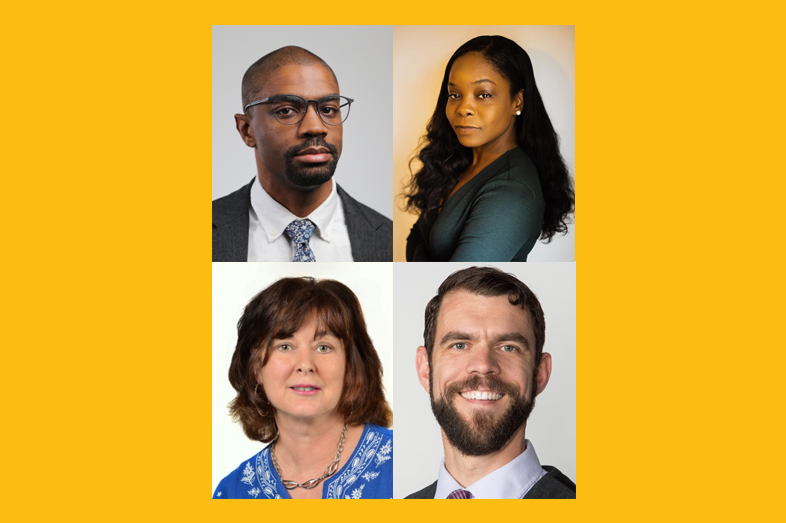The Education Writers Association asked reporters Daarel Burnette, Maureen Downey, Erica Green and Cory Turner for tips on how to be a more effective moderator. Between them, they have hundreds of hours of experience navigating tough conversations, complicated topics and unexpected questions – all while on stage!
Here are a few of the tips compiled from our conversation.
How to Prepare
- Read everything you can on the subject, just as you would for an interview. Research studies, news stories, opposing viewpoints so you aren’t surprised.
- Have a clear idea about what you want reporters to get out of the panel. At EWA, sessions are always oriented toward, “How can reporters better cover this topic?”
- Have a clear idea about why a certain speaker is on the panel. During the prep call, ask what points they think are important. Try to include as many perspectives as possible.
- Plan out the conversation in a general way – what are questions you absolutely want to get to?
Introduction
- Ask speakers to get to the meeting room 15-30 minutes early, so you can put them at ease and go over session highlights again.
- Get to the room early to make sure any audio-visual presentation slides are ready to go.
- Don’t read long speaker bios; it’s already in the program. Instead one line (name, title and organization) is enough. Is there an interesting fact or detail you can use to personalize the person?
- Give the audience a couple of minutes at the top of a road map: What are we discussing? Why is this important? How much time will there be for questions?
- Know the pronunciation of your guests’ names and their organizations.
Keep Track of Time
- Keep an eye on the time periodically to ensure you have enough time for audience questions.
- Ask an EWA staffer to give you a 10/5/1 minute cue if you need it, so you can end on time.
- Panelists can end with short final thoughts, or the moderator can wrap up.
- Maureen says remember to thank the panelists and the audience. She also tries to share contact information and additional resources if relevant. Most importantly, she says, “Have fun!”
During the Discussion
- Can you see everyone in the audience? Make eye contact with them during the discussion; they are part of the conversation!
Cory says, “Even though the audience might not say much for that hour, they want to feel like they’re seen and not just being talked at. And so I really try to constantly sort of recognize the audience, speak to the audience and ideally get the speakers to acknowledge the audience too.”
- Don’t dominate the conversation as moderator.
Maureen says when she watches panels, she dislikes it when the moderator “is literally almost giving a master’s thesis!” She says she tries to remember that panelists were invited for a reason; they’ve got something interesting to say.” Let your panelists shine!
- Be flexible in terms of sticking to your plan. Daarel says it’s OK if you don’t get to every question on your list.
“You don’t need to ask every question because you are in a room full of reporters.” He says the great thing about being around other education reporters is hearing the kinds of questions they ask. “So being able to give as much face time as possible, between the audience and the people on the panel, is key.”
- Be an active listener, and ask follow up questions based on what speakers say.
Session Scenarios: Tips for Handling Uncomfortable Situations
Someone goes off topic or monopolizes the conversation:
- You might need to interrupt someone if they are dominating the discussion – even if they are very interesting – so everyone on the panel gets to speak.
Erica says she usually says, “That’s a good thought. Let’s bring [someone else] into the conversation.” or “I hear you on this, but what about that?”
- Sometimes an audience member announces they have a two- or three-part question. Erica ‘s strategy is to say, “Let’s start with the most important one first.” Some moderators say “You have 30 seconds to ask your question.”
- If a question is completely irrelevant, as moderator, you can pivot. Daarel says he might say, “That’s an interesting question; what about this?”
Someone says something that’s untrue or inaccurate:
- You can ask another panelist what they think, or you can correct them and say “Actually, the data says X.” But remember to move the conversation forward because this is not an interview, rather, a discussion
An audience member or panelist is rude or insulting:
- Just because a question has “bite” to it, it doesn’t mean that it’s rude. Debates are healthy! Some topics are controversial and people have differing opinions.
Erica says, “Just because a question is uncomfortable, [it] doesn’t make it insulting, and it doesn’t make it an attack question. It’s not a gotcha.”
At the same time, you want the conversation to be respectful.
Cory says to trust yourself. “If you can tell based on your own gut instinct or your read of the audience that someone way overstepped, then I think it’s your obligation to step in and say, ‘OK, hold on one second. I hear you. I appreciate that you feel really strongly about this, but we need to keep this conversation civil because if it’s not civil, then it can’t be constructive, and everyone here has to feel respected.’”
It’s a delicate balance.
The video and graphic was edited by Kristan Obeng. Text written by Kavitha Cardoza.
